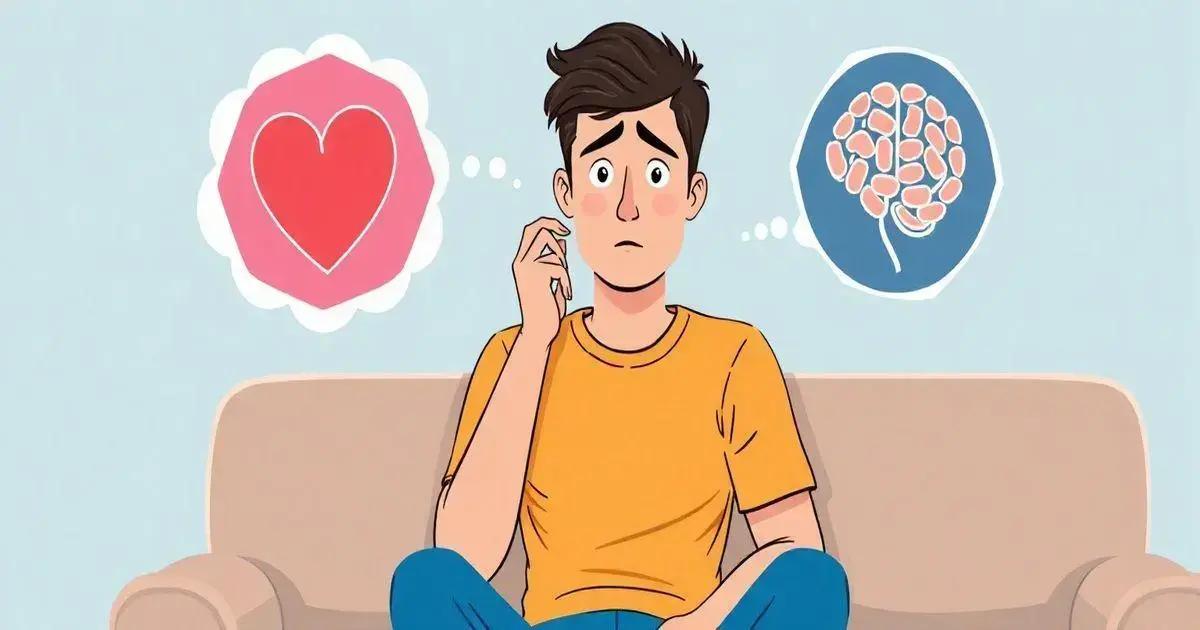Erectile dysfunction (ED) is characterized by difficulty achieving or maintaining an erection and can be influenced by various factors including lifestyle choices, psychological issues, and underlying health conditions. Treatment options range from medications and therapy to lifestyle changes, and it is essential to consult a healthcare professional for effective solutions.
Erectile dysfunction (ED) is more common than many might think. Understanding what are the warning signs of erectile dysfunction is essential for early intervention. Recognizing symptoms can help you take proactive measures to address this condition. In this article, we will delve into the common signs, when to seek medical advice, and potential treatment options to reclaim your sexual health.
Understanding Erectile Dysfunction

Erectile dysfunction (ED) is a condition that impacts a man’s ability to achieve or maintain an erection. It can affect men of all ages but is more common in older individuals. Understanding erectile dysfunction begins with knowing its causes and impacts.
What Causes Erectile Dysfunction?
ED can be caused by physical factors, psychological issues, or a combination of both. Physical causes may include:
- Heart disease
- Diabetes
- High blood pressure
- Obesity
- Certain medications
Psychological factors can include:
- Stress
- Anxiety
- Depression
- Relationship problems
Understanding these causes is essential, as they can guide proper treatment.
The Impact of Erectile Dysfunction
The effects of ED can go beyond physical health. Men experiencing ED often face emotional challenges, including:
- Low self-esteem
- Relationship issues
- Increased anxiety about sexual performance
These emotional factors can create a cycle, worsening the condition. Seeking help and having open conversations with partners can alleviate some of these feelings.
Diagnosis of Erectile Dysfunction
A healthcare provider can diagnose ED through a thorough medical history and physical examination. They may also conduct tests, like blood tests or ultrasound, to identify underlying causes. Once diagnosed, men can explore various treatment options available.
Recognizing and understanding ED is the first step toward addressing it. Acknowledging this condition and seeking help can lead to improved sexual health and overall well-being.
Common Symptoms to Watch For

Identifying the common symptoms of erectile dysfunction (ED) is crucial for timely intervention. Here are some key signs to watch for:
Difficulty Achieving an Erection
This is often the first noticeable symptom. Men may find it challenging to get an erection when they want to be intimate.
Difficulty Maintaining an Erection
Another sign is the inability to keep an erection firm enough for sexual activity. This can lead to premature withdrawal from intimate situations and impact confidence.
Reduced Sexual Desire
Men with ED might notice a decrease in libido or sexual desire. This could be due to psychological factors or an underlying health issue.
Changes in Erection Quality
Some men may experience erections that are less firm than usual. This could be a sign of developing ED and should not be ignored.
Health-Related Symptoms
In some cases, men may also experience other health-related symptoms such as fatigue, mood changes, or anxiety. These can indicate deeper issues that may need medical attention.
Recognizing these symptoms early enables men to seek help and start a dialogue with healthcare professionals about treatment options.
When to See a Doctor

Knowing when to see a doctor about erectile dysfunction (ED) is important for maintaining sexual and overall health. Here are some key points to consider:
Persistent Symptoms
If you experience symptoms of ED consistently over a period of time, it’s essential to consult a healthcare provider. This includes repeated difficulty getting or maintaining an erection.
Impact on Relationships
If ED affects your relationship or intimacy with your partner, it’s a good idea to seek help. Open communication and professional advice can open doors to solutions.
Presence of Other Health Issues
If you have conditions like diabetes, heart disease, or high blood pressure, it is wise to talk to your doctor about any changes in your sexual health. These conditions can be linked to erectile dysfunction.
Emotional Distress
Feelings of anxiety, stress, or depression related to your sexual performance can indicate a need for professional help. Mental health plays a significant role in sexual function.
Concerns About Underlying Disorders
ED can sometimes signal underlying health issues. If you notice other concerning symptoms like pain or changes in urination, don’t hesitate to reach out to your healthcare provider.
Taking action early can lead to effective treatment and improve quality of life.
Lifestyle Factors Affecting ED

Certain lifestyle factors can significantly impact erectile dysfunction (ED). By being aware of these factors, men can take steps to improve their sexual health. Here are some important ones to consider:
Poor Diet
A diet high in saturated fats and sugars can lead to obesity, which is a known risk factor for ED. Eating a balanced diet rich in fruits, vegetables, whole grains, and lean proteins can promote better overall health.
Lack of Exercise
Being inactive can contribute to weight gain and various health issues, including diabetes and heart disease. Regular physical activity can enhance circulation and improve erectile function. Aim for at least 30 minutes of moderate exercise most days of the week.
Smoking
Smoking can restrict blood flow and damage blood vessels, making it a significant contributor to ED. Quitting smoking can improve not only sexual health but overall well-being as well.
Alcohol Consumption
Excessive alcohol intake can lead to ED by affecting hormones and reducing sexual desire. While moderate drinking may not have significant effects, it’s essential to drink responsibly.
Stress and Mental Health
High-stress levels can impact sexual performance. Stress, anxiety, and depression can interfere with sexual arousal and function. Seeking help for mental health issues can improve sexual health as well.
Making healthier lifestyle choices can lead to improvements in erectile dysfunction, encouraging a more fulfilling sexual life.
Treatment Options and Solutions

There are several treatment options and solutions available for men experiencing erectile dysfunction (ED). It is essential to consult a healthcare professional to determine the best approach. Here are some common treatments:
Medications
Many men find relief through oral medications like Viagra (sildenafil), Cialis (tadalafil), and Levitra (vardenafil). These drugs help increase blood flow to the penis, making it easier to achieve an erection.
Therapy
For those whose ED is linked to psychological factors, therapy can be beneficial. Cognitive Behavioral Therapy (CBT) is one method that helps address anxiety, depression, or relationship issues that may contribute to ED.
Vacuum Erection Devices
This device creates a vacuum around the penis, encouraging blood flow and producing an erection. A band is then placed at the base of the penis to maintain the erection for sexual activity.
Penis Pumps and Implants
Pensile implants are a surgical option for men with ED who do not respond to other treatments. These implants allow men to manually create an erection. Another option is the intraurethral pellet that can also help induce an erection.
Lifestyle Changes
Improving lifestyle factors such as diet, exercise, and reducing alcohol intake can also play a critical role in treating ED. Making these changes can enhance overall health and sexual performance.
Ultimately, the right treatment will vary for each individual, and professional guidance is essential to find a personalized solution.
Understanding and Addressing Erectile Dysfunction
Recognizing the warning signs of erectile dysfunction (ED) is crucial for timely intervention. By understanding the condition, identifying common symptoms, and knowing when to seek help, individuals can take proactive steps toward improving their sexual health.
Lifestyle factors play a significant role in ED, and making healthier choices can lead to positive outcomes. Fortunately, there are various treatment options available, including medication, therapy, and lifestyle changes.
Ultimately, seeking guidance from healthcare professionals can lead to effective solutions, enabling men to regain confidence and improve their quality of life. Addressing ED is not only beneficial for personal health but also enhances relationships and overall well-being.
FAQ – Common Questions About Erectile Dysfunction
What are the warning signs of erectile dysfunction (ED)?
Common signs include difficulty achieving or maintaining an erection, reduced sexual desire, and changes in erection quality.
When should I see a doctor about ED?
If you experience persistent symptoms, emotional distress, or have underlying health conditions like diabetes or heart disease, it’s essential to seek medical advice.
What lifestyle factors can affect erectile dysfunction?
Poor diet, lack of exercise, smoking, excessive alcohol consumption, and high stress levels can all contribute to ED.
What treatment options are available for ED?
Treatment options include medications, therapy, vacuum erection devices, penile implants, and lifestyle changes to improve overall health.
Can psychological factors contribute to erectile dysfunction?
Yes, anxiety, stress, and depression can all impact sexual performance and contribute to ED.
Is ED common among men?
Yes, erectile dysfunction is a common issue that can affect men of all ages, though it is more prevalent in older individuals.












